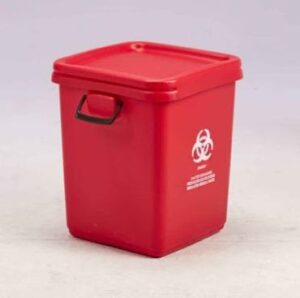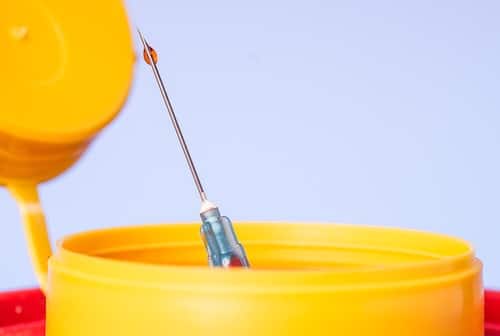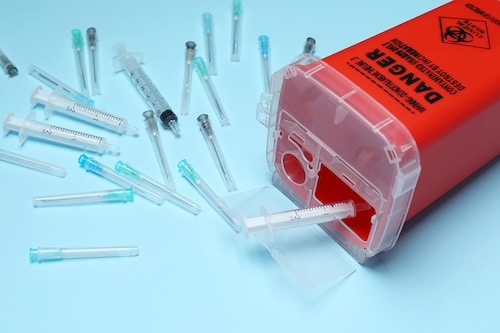Sharps Waste Disposal Services
Sharps Waste Disposal Guidelines
Proper sharps disposal in Florida is crucial for maintaining a safe healthcare environment and ensuring compliance with state regulations. Follow these simple steps to manage your sharps waste correctly:
Step 1:
Placement & Labeling
(Florida Administrative Code 64E-16)
- Before use, label each sharps container with your facility’s name, address, and phone number.
- Place new sharps containers either in wall mounts or securely on countertops within the immediate area where sharps are used, following the “point of use disposal” best practices.
Step 3:
Designated Accumulation Area
(Florida Administrative Code 64E-16.004)
- Before your scheduled pickup, remove filled sharps containers from patient care areas and place them upright inside the regulated medical waste (RMW) container to prevent leaks or spills.
- Always replace used sharps containers promptly to maintain a safe and compliant environment.
- Sharps containers should be commingled with sealed biohazard bags inside the RMW containers for proper and safe disposal.
Step 4:
Scheduled Medical Waste Service
(Florida Statute 403.7226)
- On your scheduled service day, All Points Medical Waste will perform a one-for-one exchange of your onsite regulated medical waste (RMW) container and deliver any pre-ordered products such as sharps containers and biohazard bags.
- Any waste that does not make it into the medical waste container before our arrival may be placed into the new container for pickup on your next scheduled service day.
- Following these steps ensures compliance with Florida laws and keeps your facility safe and efficient. For any questions or assistance, contact All Point Medical Waste
Medications
- Sharps containers are not designed for the disposal of any medications, including pills, liquids, or topical creams.
- Medications should be discarded according to the guidelines set by your healthcare provider, local pharmacy, or through authorized drug take-back programs.
Non-Sharps Medical Waste
- Items like tape, paper products, bandages, gauze, exam gloves, and alcohol prep pads should be disposed of in a designated biohazard waste container—not a sharps container.
Hazardous Materials
- Aerosol cans and inhalers are considered hazardous (RCRA-regulated) waste and must be disposed of through specialized hazardous waste programs.
General Waste
- Household garbage or any type of liquid should never be placed in sharps containers.
- Batteries, regardless of type, require proper recycling or hazardous waste disposal and should not go into sharps containers.
What Is Sharps Waste?
According to the Occupational Safety and Health Administration (OSHA), sharps are objects that can pierce the skin, such as needles, scalpels, broken glass, capillary tubes, and the exposed ends of dental wires. If blood or other potentially infectious materials (OPIM), as outlined in OSHA’s Bloodborne Pathogens Standard (29 CFR 1910.1030), are present or could be present on the object, it is classified as a contaminated sharp, and proper personal protective equipment (PPE) must be worn during handling.
Common examples of sharps waste include:
Needles
Hollow needles used to inject medications.
Syringes
With or without attached needles.
Blood Vials
Tubes used for blood collection and storage.
Lancets
Small, double-edged blades used for blood sugar or other testing (also known as “fingerstick” devices).
Infusion Sets
Tubing and needle systems used for medication delivery under the skin.
Connection Needles / Connection Sets
Specialized needles used in home dialysis and other treatments.
Scalpels and Surgical Blades
Used in medical and surgical procedures.
Scissors
Instruments used for cutting tissue or dressings that may become contaminated.
Glass
Broken or unbroken glass that could cause injury, even if not visibly contaminated.
Sharp Plastic
Certain rigid plastics that can puncture or cut and may require special disposal handling.
Proper sharps disposal is critical to maintaining a safe healthcare environment and complying with Florida medical waste regulations. At All Points Medical Waste, we provide secure sharps disposal solutions to help protect your staff, patients, and community.
Contact us today to learn more about our compliant sharps management and medical waste disposal services across Florida.






